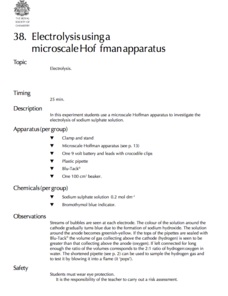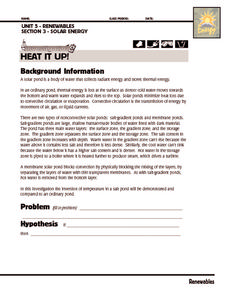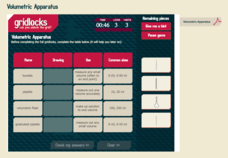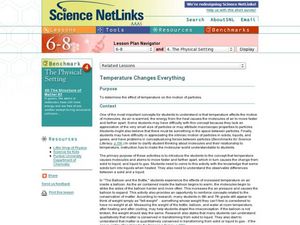National Renewable Energy Laboratory
Biomass: Biogas Generator
It's a gas. Middle schoolers build a biogas generator following the directions in this resource. After a few days of observation, they demonstrate that the gas given off by the decomposing manure is flammable. The activity concludes as...
Curated OER
Density of a Gas
Eighth graders investigate the mass, volume, and density of a gas by producing it in a chemical reaction. The entire Density of a Gas Lab and L section of the K W L chart be formatively assessed.
Curated OER
Gases
In this gas worksheet, students convert within units of pressure and temperature, they solve problems using the various gas laws, they explain concepts as they related to the kinetic molecular theory and they discuss details of a...
Santa Monica College
The Properties of Oxygen Gas
Scholars generate and collect pure oxygen through a decomposition reaction of hydrogen peroxide in the fourth lesson of an 11-part series. Then, they complete six investigations into the properties of oxygen.
Steinhardt Apps
Kinetic Molecular Theory
Building off young chemists' knowledge of the states of matter, kinetic molecular theory is the focus of the unit. Eight days of lessons including multiple demonstrations, one lab experiment, directed instruction, and worksheets,...
Curated OER
Activities for a High School Instrumentation Course
The intent of this series of activities is to introduce high schoolers to the field of chemical instrumentaiton. They perform a few basic chemistry lab techniques: pH titration, paper, gas, and liquid chromatography, ultraviolet and...
Curated OER
The Conservation Of Mass (The Mass Of Gas)
Middle schoolers gain an understanding of matter in all of its phases. In this science lesson plan, students further their knowledge of the laws of conservation of mass, the loss in mass can be accounted for, when the gas is allowed to...
Curated OER
Chemistry Lab-Molar Volume of Gas
Students determine the molar volume of hydrogen gas. In this molar volume lesson plan, students find the molar volume of hydrogen produced in a reaction between magnesium and hydrochloric acid. They use a eudiometer to measure the volume...
Curated OER
Absolute Zero Lab
In this absolute zero worksheet, students experiment with a closed-end syringe and a ice bath and boiling water. They record volumes of gases in the syringe as well as temperatures of the water and they plot their experimental data. They...
Curated OER
Popcorn Is a Gas
Learners investigate why and how popcorn pops. In this gas lesson plan, students observe and make suggestions as to what causes popcorn to pop after observing popped corn and corn kernels. Learners mass the kernels before and after...
Curated OER
Chemistry Lab: Chemical Equilibrium
Students investigate the effects of adding or removing a reactant or a product on chemical equilibrium. In this equilibrium lesson plan, students add or remove ions to solutions to determine the effects on equilibrium. They make...
Curated OER
Chemistry Lab-Heat of Fusion
Students determine the heat of fusion of ice. In this heat of fusion lesson plan, students use a calorimeter to measure the molar heat of fusion of ice. Students determine the heat required to melt one mole of ice using hot water and ice...
Baylor College
What Is the Water Cycle?
Small groups place sand and ice in a covered box, place the box in the sunlight, then observe as evaporation, condensation, and precipitation occur. These models serve as miniature water cycles and demonstrations of the three phases of...
Curated OER
Solid, Liquid or Gas?
Learners explore solid, liquids, and gases. In this science lesson plan, students distinguish similarities and differences of matter and recognize that different states of matter may appear in one substance.
Wild BC
The Greenhouse Effect: Warming the Earth Experiment
First in a two-part lesson on the greenhouse effect, this lesson involves a classroom demonstration of the phenomenon, and a lab group experiment with color and absorption. Although there are easier ways to demonstrate the greenhouse...
Royal Society of Chemistry
Electrolysis Using a Microscale Hoffman Apparatus—Microscale Chemistry
Get big results out of a small-scale lab! Young chemists observe the electrolysis of sodium sulfate using a microscale experiment. A colorful indicator solution combined with the production of gas bubbles yields a variety of observations...
Cornell University
Atomic Bonding
Explore the connection of surface area to bonding within atoms. Learners complete lab investigations to model changing surface area with different sizes and concentrations of atoms. A flour fireball demonstration follows the labs to...
Texas State Energy Conservation Office
Investigation: Heat it Up!
This demonstration of solar ponds can be used in an earth, environmental, or physical science setting. Lab groups set up a solar pond and model how it is able, due to a salt concentration gradient, to maintain heat for future use.
Royal Society of Chemistry
Volumetric Apparatus
Can your class tell the difference between a burette and a pipette? Develop their lab apparatus knowledge using a series of puzzles. The online activity associates the name, image, and sizes of burettes, pipettes, volumetric flasks, and...
Curated OER
Temperature Changes Everything
Middle school chemists visit interactive websites in order to discover what happens to molecular motion when heat is added to matter. They conduct an experiment that demonstrates the expansion of matter with the addition of heat. A lab...
CK-12 Foundation
Crash
Explore the chemistry behind the airbags that keep you safe in a collision. Using a simulation, your classes find the best gas to use to inflate an airbag. The simulation shows the time it takes to inflate to a maximum volume....
Curated OER
Lab Activity: Model of the Planets
This worksheet leads the class through the calculations needed to construct circles to represent the planets of our Solar System. The actual values are provided, as are suggested calculations to create the scale diameters. The ten...
Curated OER
Cooperative Learning Experience Through the Flipping Lid Demo
Students create a cartoon illustrating a lab demonstration. In this lab safety lesson, the teacher demonstrates a small methane explosion to demonstrate the importance of safety in a laboratory setting, then students work in groups to...
Curated OER
Chemical and Physical Changes
Eighth graders investigate different gas behaviors. In this chemistry instructional activity, 8th graders describe how changing volume and temperature affect gas particles motion. They collect data and make a generalization about these...
Other popular searches
- Got Gas Density Lab
- Ideal Gas Laws Lab
- Ideal Gas Law Lab
- Greenhouse Gas Lab
- Combined Gas Law Labs
- Gas Lab Alka Seltzer
- Gas Lab Alika Seltzer

























